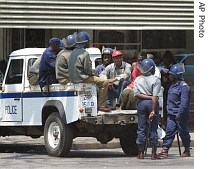2006年VOA标准英语-Anti-Government Protests Fizzle in Zimbabwe
时间:2019-01-16 作者:英语课 分类:2006年VOA标准英语(九月)
By Tendai Maphosa
Harare
13 September 2006
In Zimbabwe, police have prevented protest marches organized by the Zimbabwe Congress of Trade Unions from taking place. In Harare and elsewhere in the country, the police sealed off the places where marchers were supposed to gather and arrested trade union leaders.
-------

Riot police keep an eye on detained protesters after they were arrested in Harare
The marches, which were take place across the country, were called to protest the harsh economic conditions in the country as well as the lack of access for workers to drugs that fight AIDS.
But by midday in Harare, when the march was meant to start, there was no sign of any marchers or the leaders of the Zimbabwe Congress of Trade Unions, who had called for the nationwide protests.
Police stopped all motorized traffic from approaching the point where the march was supposed to start but pedestrians 1 were generally left alone.
Armed police kept an eye on the people within the cordon 2. Youths in ruling ZANU-PF T-shirts also patrolled the streets. The government had declared that the marches were illegal and warned that the security forces were ready to deal with those who took part.
About 15 leaders of the Zimbabwe Congress of Trade Unions, including Secretary- General Wellington Chibhebe and Chairman Lovemore Matombo, were assaulted and taken away by the police.
Sources in Bulawayo, Zimbabwe's second city, told VOA that the planned march there also failed to take place and that about 20 trade union organizers were arrested. VOA also has information from other centers that brings the total those arrested nationwide to more than 80 people.
Various civic 3 organizations had pledged to participate in the marches, including the Zimbabwe National Students Union. Promise Mkwanazi, president of the union, blamed what he called the government's heavy-handed action for the failure of the marches to take place. But he said the worsening economic conditions in Zimbabwe would eventually force many people to respond to further calls for mass action.
"I think it remains 4 the only viable 5 option - peaceful democratic resistance [to] the current regime - because the government has demonstrated its unwillingness 6 to address people's concerns in a more rational way," he said.
Zimbabwe is currently facing its worst economic crisis since independence 26 years ago. Inflation is close to 1,000 percent, unemployment stands at 80 percent. Fuel and foreign currency are in short supply. The country has been suffering for years from shortages of food and other basics. What supplies are available are beyond the reach of the majority of the population.
- Several pedestrians had come to grief on the icy pavement. 几个行人在结冰的人行道上滑倒了。 来自《简明英汉词典》
- Pedestrians keep to the sidewalk [footpath]! 行人走便道。 来自《现代汉英综合大词典》
- Police officers threw a cordon around his car to protect him.警察在他汽车周围设置了防卫圈以保护他。
- There is a tight security cordon around the area.这一地区周围设有严密的安全警戒圈。
- I feel it is my civic duty to vote.我认为投票选举是我作为公民的义务。
- The civic leaders helped to forward the project.市政府领导者协助促进工程的进展。
- He ate the remains of food hungrily.他狼吞虎咽地吃剩余的食物。
- The remains of the meal were fed to the dog.残羹剩饭喂狗了。
- The scheme is economically viable.这个计划从经济效益来看是可行的。
- The economy of the country is not viable.这个国家经济是难以维持的。
- Her unwillingness to answer questions undermined the strength of her position. 她不愿回答问题,这不利于她所处的形势。
- His apparent unwillingness would disappear if we paid him enough. 如果我们付足了钱,他露出的那副不乐意的神情就会消失。